SA Weekend cover story: Field of dreams – The Adelaide duo on a mission to heal
Zaachariaha Fielding and Michael Ross make modern pop music interwoven with ancient tradition with an underlying mission – healing. Listen to this story in podcast form.
SA Weekend
Don't miss out on the headlines from SA Weekend. Followed categories will be added to My News.
One hails from a remote desert community in the APY lands, an Indigenous singer with an androgynous voice, an ethereal voice that’s unique in Australian music.
The other comes from deep in Australian suburbia, a musical prodigy with an ear for a pop hook and the ability to weave intricate sonic canvases to showcase that voice.
Both are gay, both buck gender stereotypes, and both have felt the bullying and oppression that comes with being different and refusing to fit into society’s neat boxes.
On October 24, 2020, Electric Fields – as Zaachariaha Fielding and Michael Ross are known – commanded the attention of tens of thousands of AFL grand final fans at the Gabba, and millions more at home, while they told the story of Vincent Lingiari’s struggle to win back his people’s land with a stunning cover of Kev Carmody and Paul Kelly’s From Little Things Big Things Grow.
It’s the blokiest of arenas, a long way from the Mardi Gras concert they headlined a fortnight ago, but Fielding and Ross are happy to get their message – their philosophy – out to whoever needs to hear it.
LISTEN TO THIS ARTICLE IN PODCAST FORM
It’s OK to be you, their music says. You are strong. You’ve got this. You can heal.
Describing the music of Electric Fields is no easy task. Many have tried, but it’s not a band that can be easily categorised.
“Daft Punk meets Nina Simone in the Deep Forest” gets thrown around a bit, and while it’s a decent attempt it doesn’t entirely convey exactly what this Adelaide duo does.
On one hand this collaboration makes very modern music that’s rooted in house, electronica, jazz and pop. On the other hand Electric Fields looks back – perhaps further back than any other pop band – by weaving Indigenous Anangu languages and ancient songlines into its work, stories whose age is unknowable that have been passed down through Fielding’s family line for centuries, perhaps millennia.
Visually there’s a push and pull too – Ross behind his keyboard, slight of frame, shaved head, and Fielding out front, a proud Anangu singer from the desert country, tall, braids to his waist.
But this is no “opposites attract” story. You only have to watch them play, or even interact off stage, to see that they are connected on a very deep level. Collaborators and best friends, two people on a mission to heal through music.
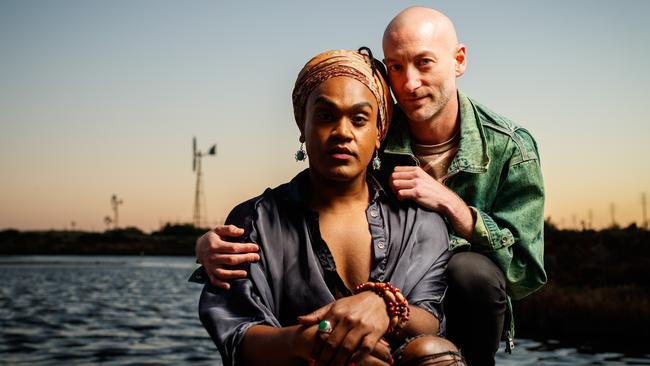
And while healing is the philosophy behind Electric Fields it would be pointless, they say, if that philosophy wasn’t buried within good art. “We’re not psychologists – we make art and the art must always come first,” Ross says.
“If the message is stronger than the art, then I find that very hard to digest. If you’ve got something important to say then you’d better say it well. If it needs to be heard, if it’s important, then make it in gold, not in tin.”
And gold is exactly what they’ve been making, recording an acclaimed album and several singles, lighting up the pop charts both here and overseas, dropping scintillating live shows and performing to a global audience in the 2019 Australian Eurovision heats (they narrowly missed out to Kate Miller-Heidke).
It’s no real surprise, then, to find out that Fielding and Ross actually enjoyed the enforced break that came with the pandemic. It gave Electric Fields a chance to collect their collective breath, to have some down time after playing more than 60 gigs around Australia and overseas.
And for Fielding, the son of renowned APY artist Robert Fielding, it gave him the chance to go home to Mimili, pick up a brush and connect with his art.
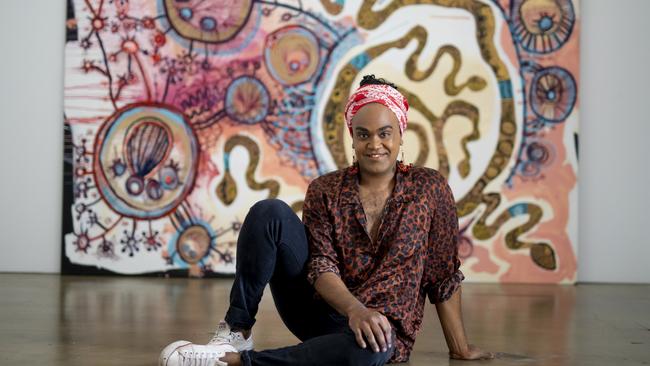
“You might not have become a visual artist if it wasn’t for COVID,” Ross says to Fielding, referring to Fielding’s first successful exhibition Gold and Silver Linings. He continues with a cheeky laugh: “It got the ball rolling and allowed Z to reach a point where he’s a legitimate national and - well we’ll wait for the next exhibition until we say international, shall we?”
But the large-scale pieces that combine traditional Indigenous styles with the contemporary feel of artists like Jean-Michel Basquiat and John Olsen made a real impact when it graced the walls of Adelaide’s APY Gallery in November. Remarkable given it was Fielding’s first serious foray into visual arts.
“When I was younger my dad tried to get me to paint, but it never really happened,” Fielding says.
“Dad is very much about the ochre colours, as many artists from the APY Lands are, but when I got into the studio I just started playing with these blues, navies and magentas – they spoke to me.”
Born in Port Augusta Hospital in 1991, Fielding grew up in Mimili as the oldest of nine brothers and sisters in the tiny community about 100km south of the SA/Northern Territory border. Sent down to Adelaide to complete his schooling, Fielding found himself with a foot in two worlds.
“I moved to Adelaide to do Years 10, 11 and 12 at Woodville High School, “ he says. “It was really good, it was a multicultural school, and that was my first taste of western people.
“I just found it a natural to be the oldest in my family, and because I’d had a taste of the western world I was able to come home and teach this part of the culture as well as Anangu culture.”
But negotiating high school is a tricky path for any kid, and there are plenty of bumps in that path if you’re a gay, Indigenous kid trying to find his way in the city.
“I remember feeling very vulnerable and not really knowing how to act around people, already knowing that I was different,” Fielding recalls. “Socially, it was difficult. How much of your limp wrist do you show? How do you move in your body?”
Ross continues: “He had to navigate this ‘do you not like me because I’m Aboriginal or do you not like me because I’m gay?’ Oh, it’s that reason, OK.”
“It was the language barrier as well, “ Fielding says. “I speak a lot of English at home, but they use it differently here.”
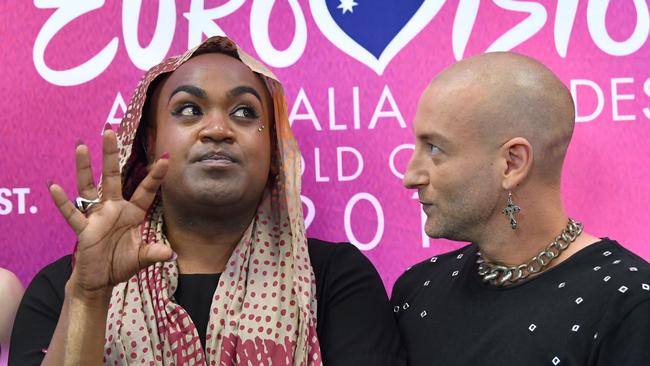
For Fielding, the realisation that he was gay and didn’t fit into any of the usual parameters of gender came early. Very early.
“I think I knew I was gay when … when I first started walking!” he says. “I always knew that I was something else, and I was a little bit lonely for a bit until I met other people like me in high school.
“Growing up, I definitely was teased a lot. Kids know that you’re different. They monitor you and identify that difference. I was called by the gender that they feel that you are, and I was always teased for being both male and female. At the time I found it insulting, but eventually I learned to embrace it.”
Life for the young Ross also had its challenges. A boy soprano who was composing music at the age of five tends to stand out in Logan, a sprawling suburb between Brisbane and the Gold Coast. “Logan at that time was prejudiced against anyone who wasn’t a straight white man,” Ross recalls. “If you were a woman, gay, black, Aboriginal, Greek – anything could make you a target for cruelty. I am so glad that we seem to be moving away from that, because it’s very sad, low vibration life that helps nobody, not even the bully.”
After studying music at university and landing a record deal, Ross built “a portable, pop-up vaudevillian stage” where he “would perform songs about being a celibate homosexual”.
Both Ross and Fielding had a crack at the reality television route – Fielding appearing on the X-Factor in 2011 and The Voice in 2014 and Ross performing on the X-Factor in 2014. Both received glowing reviews from the judges, but neither went on to the kind of stardom afforded to some, but not many, TV talent show contestants.
YouTube clips of Fielding during his 2011 appearance show a nervous and shy performer covering Tracy Chapman’s Talkin’ ‘bout a Revolution, still years away from the dynamic stage presence he presents in 2021.
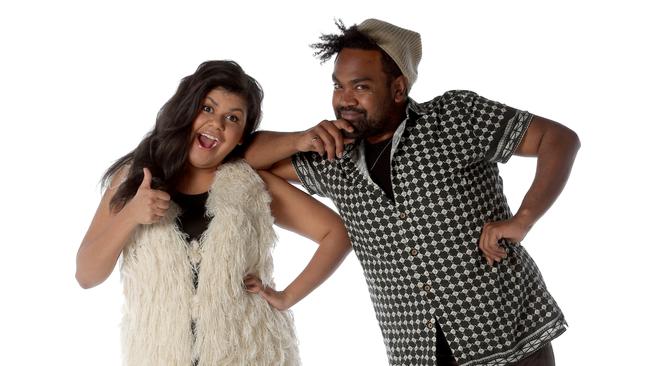
“The way I am is what that little tiny community did for me,” the young Fielding said in a piece to camera before his performance. “I want people to look at this black person and say, ‘oh, that’s a beautiful voice’.”
Judge Guy Sebastian certainly thought so, telling Fielding he had what it takes to be a true star. He was right, but it would be a few more years coming.
In 2015, Ross found himself in Adelaide working with Tutti Arts, a leader in the disability arts sector. One day local songwriter Robyn Habel got in touch. She’d penned some new tunes that she thought would suit Fielding’s voice, and they needed a producer to work on the project. They didn’t know it at the time, but the seeds to Electric Fields were sown in that studio.
“We found ourselves, as strangers in the Adelaide Hills, thrown together as a trio to work on these songs,” Ross says.
“This was first time recording in a studio, it was very new to me,” Fielding says. “It was the first time I’d heard my voice recorded and sounding good.”
And while the seeds were sown, it was a slow-growing tree, with five years passing before Electric Fields became an official “thing”.
Once official, though, it didn’t take the listening public long to embrace the group’s sound and look, and Ross and Fielding very quickly found themselves in demand. It all happened, they say, in a flash and they found themselves working so hard they almost didn’t dare take a break and risk stopping the momentum.
“I think we were so invested in the project, every time we had a chance to stop for a moment we were like, ‘Oh, we’re in this year now’,” Ross says.
“The seasons moved so fast, but we were focused on the next gig, then going back into the studio – we just had such a strong focus on making good music and trying to do better in our live shows. And it still is a bit like that.”
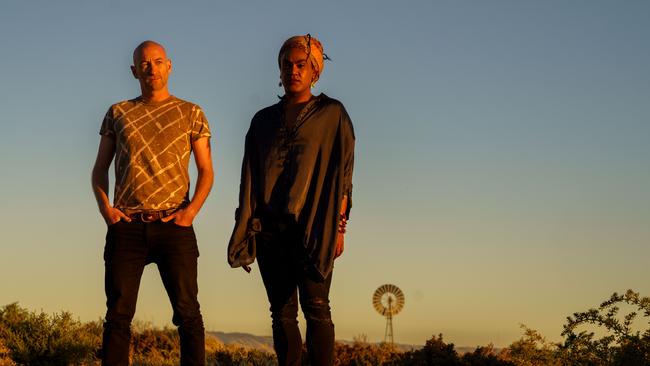
For Fielding, who says he also knew he was destined to be a singer from “the time I could walk”, finding Ross gave him a framework and a way to use his unique gift.
“There were things that I knew were keys to something in the future, but I didn’t know how to use these keys until Electric Fields,” he says.
“I’ve learned a lot through Electric Fields. It’s been more than creating music and travelling to different cities. For myself, I’ve developed this attention to detail around who I am and what I am and what I’m capable of. Both inside of Electric Fields and outside of Electric Fields.”
And Ross says his life, too, has changed for the better, and points to the opportunity to compose music to accompany Fielding’s songlines as a highlight.
“I really am so thrilled to be doing this,” he says.
“Working with Z has given me so many wonderful gifts – playing the Grand Final or writing the music to accompany a Nina Simone interview – and these very old Inma songs are another one of those gifts, and definitely one of the best. There’s a spiritual feeling, a conjuring to it. It’s just so beautiful, so beautiful.”
Both artists agree that working together in Electric Fields has allowed them to heal old wounds and become more complete humans. And if their music, full as it is with messages of empowerment and empathy, makes the world just a little bit better then they’re OK with that to.
“It’s when you’re evolving and observing – that’s what Electric Fields writes about,” Fielding says. “It’s about feeling, it’s about reflection, documenting our individual selves and fixing anything that society may have broken and that we might have allowed to continue.
“It’s about finding the control and power to stop that addiction to self-sabotage. So we write for ourselves, to remind ourselves that we are learning and evolving, and how we just want to feel comfortable and safe.”
Ross agrees. “We show people a version of the world that we want to live,” he says.
Electric Fields has composed a special, never-before-heard track that will accompany the illumination of the ancient MacDonnell Ranges for this year’s opening night of the Parrtjima – A Festival in Light event.
The festival runs from April 9 to 18. More information at parrtjimaaustralia.com.au



